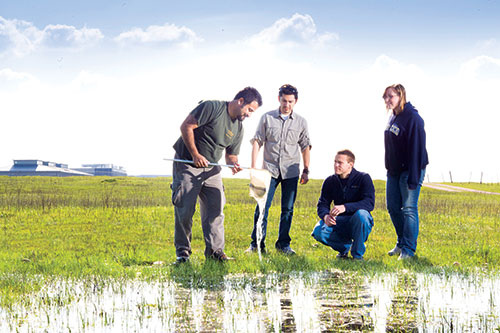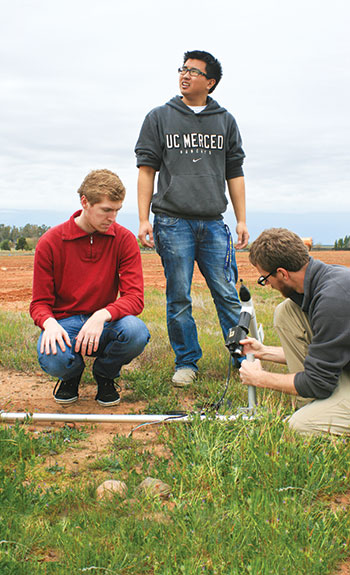 Overview of Environmental Systems Science
Overview of Environmental Systems Science
Environmental Systems Science is a major that prepares students to understand and solve critical challenges facing our environment, such as climate change, water and soil pollution, conservation of biological diversity and management of natural resources. It integrates the study of fundamental physical, chemical and biological processes that shape our environment with practical applications to real-world problems. The major is taught by a highly interdisciplinary group of faculty members. Check out their lab websites to learn more about their research and the courses they teach.
About the Program
The Environmental Systems Science program offers interdisciplinary and flexible coursework. Core courses provide students with a firm foundation in the fundamentals of chemistry, biology, hydrology, ecology and Earth sciences, while upper-division elective courses allow students the flexibility to pursue a variety of topics related to Earth and environmental systems. Our courses emphasize an integrated approach to the discipline, incorporating field studies, laboratory experiments and computations.
Areas of Research
- Climate change and water resources
- Water from the Sierra Nevada
- Conservation of Biological Diversity
 Potential Careers
Potential Careers
- Urban ecology researcher
- Environmental analyst
- Natural resource manager
- Wildlife manager
- Air quality and assessment expert
- Meteorologist
- Environmental health and safety director
- Conservation consultant
- Ecologist
- Clean technology expert
- Endangered species researcher
* Please Note: Some of these carers might require education beyond a Bachelor's degree.
Learning Outcomes
Students graduating from the Environmental Systems Science program demonstrate the following:
- Foundational knowledge of physics, chemistry, biology, and mathematics related to Earth systems that supports a working knowledge of basic research methodologies, data analysis, and interpretation for a variety of Earth-related data.
- Knowledge of major concepts, theoretical principles, experimental findings, and areas of study related to Earth systems science, and comprehension of the interactions between natural Earth systems and human economic, political, and social systems.
- An ability to employ critical thinking, quantitative and numerical analyses, and hypothesis-driven methods of scientific inquiry in the formulation of research questions, experimental design, application and use of laboratory and field instrumentation, and analysis and interpretation of data related to Earth systems.
- Effective written and oral communication skills, especially the ability to transmit complex technical information.
- An ability to work effectively individually and in teams in classroom, laboratory, and field settings.
Sample plans of study for the Environmental Systems Science degree may be found in the School of Natural Sciences website ns-advising.ucmerced.edu.
More Information about Environmental Systems Science
- Degree Requirements: Environmental Systems Science,, B.S.
- School of Natural Sciences
- Staff & Faculty
- Brochure, School of Natural Sciences (pdf)

